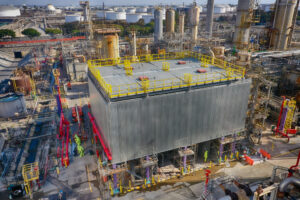
Refinery’s Voluntary Safety Enhancements Projects Completed and Operational
The following is a status update of the voluntary safety enhancement projects the Torrance Refining has completed on its Alkylation Unit in cooperation with local, state and federal agencies.
California residents live in a state with the strictest environmental regulations, yet they still enjoy freedom to drive where they want, when they want, and in the vehicles of their choice with the reassurance their local refineries produce the world’s cleanest-burning gasoline using process called alkylation. The unique, cleaner-burning gasoline mandated to be sold in California requires a high-octane component called alkylate to comply with the most stringent tailpipe emissions in the world. Continue reading…
MHF Alkylation in Petroleum Refining
Resource Links
Setting the Record Straight: The Truth About Torrance Refinery MHF
Torrance Refinery MHF Alkylation Unit Safety Systems
California Energy Commission Transportation Fuel Issues Report
Impact of an HF Ban on Southern California Transportation Fuels Supply
Torrance Refinery Economic Impact Study
Torrance Fire Department Presentation
United Steelworkers Union MHF Advertisement
Op-ed from Torrance Refinery Manager Steve Steach
Statement from the United Steelworkers Union
Torrance Refinery Comment Letter to Manhattan Beach City Council
Torrance Refinery Comment Letter to SCAQMD (April 17, 2018)
Torrance Refinery Comment Letter to SCAQMD (February 6, 2018)
Torrance Refinery Comment Letter to SCAQMD (January 18, 2018)
Torrance Refinery Comment Letter to SCAQMD (December 12, 2017)
Torrance Refinery Comment Letter to SCAQMD (October 10, 2017)
Torrance Refinery Comment Letter to SCAQMD (September 20, 2017)
Torrance Refinery Comment Letter to SCAQMD (August 23, 2017)
Setting The Record Straight
Jeff Dill – Our Priorities
Tim Shepperd – Why MHF Works
Marie Wright – Examples
Jatin Shah – Risk Management
Curt Lawrence – Safety Systems
Question and Answer
